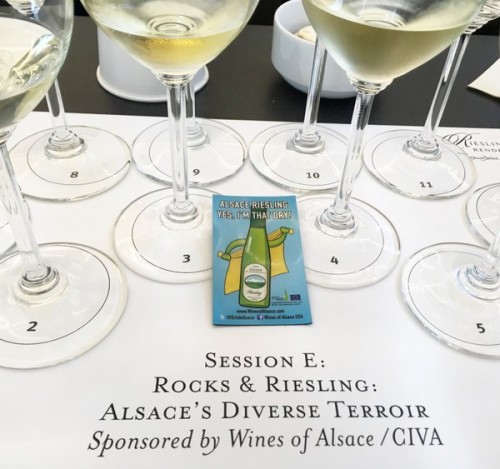
Three days in Seattle. So much Riesling! The fifth annual Riesling Rendezvous was in town, and I attended it for the first time.
Riesling is a grape that has had to struggle a bit to gain the recognition it deserves. ‘We are hitting our heads against the brick wall of understanding,’ said Ernie Loosen, as he kicked things off with a short introductory speech. ‘But we are making progress.’
‘Most people will love Riesling once they taste a good one,’ he says. But it is difficult to simplify the message for normal consumers. ‘I can’t omit the fact that we are talking about a wine that has a particular taste because of how it is made and where it is made,’ said Loosen. ‘There are always a lot of discussion about how to find the most simple single message, but there is no holy grail message: the simple truth is that Riesling is complicated.’
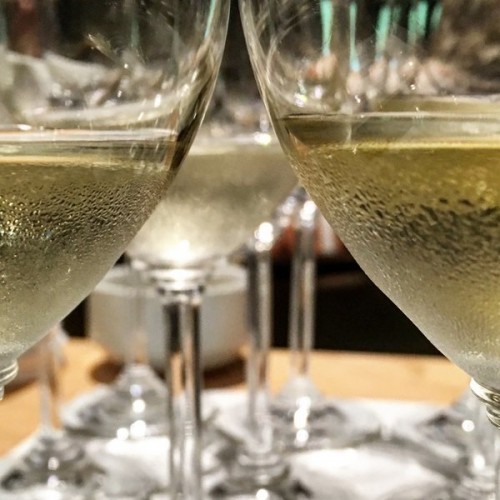
But rather than shy away from this complexity, it should be included as part of the story, and appeal, of Riesling. ‘We should truly embrace its diversity and complexity,’ says Loosen. ‘It is not just Riesling that is complicated – wine itself is complicated. If we winemakers don’t want to simplify what we are doing, why should we make it simple for the consumers? Why shouldn’t we challenge them?’
Loosen thinks that the first step is to get people to dry good dry Riesling and then build from there. ‘We shouldn’t try to make the story of Riesling too simple. We are here to find out how we can communicate our enthusiasm and passion.’
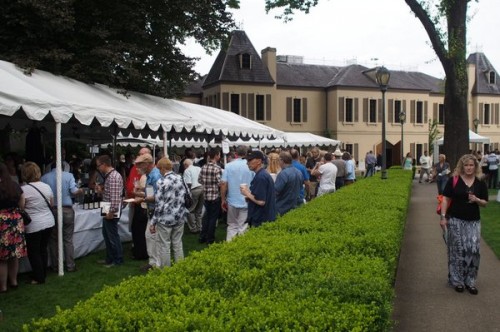
The event began on Sunday night, with a grand tasting at Chateau St Michelle in Woodinville, a thirty-minute drive out of town. This was superbly organized and enjoyed perfect summer weather, which is a good job because it was outdoors. And this is Seattle.
The wines being poured covered the world of Riesling pretty well, with a mix of famous names and newcomers. I really enjoyed it, but would have enjoyed it much more if the organizers had issued etiquette guidelines for tasting at this sort of event.
It all works beautifully if people take a pour, then exit the table to allow others to get a pour of the wine. But most consumers aren’t aware of this: they stand there, glass in hand, blocking access for others. Organizers can help a little this by not putting spittoons on tables. And then there are the producers themselves, who sometimes can be a little clueless, ignoring people waiting while they are involved in a lengthy discussion with others. This is made worse when attractive girls are involved and middle-aged guys are pouring. The German tables quickly became impossible to taste at.
Still, this was a benchmark example of a really good grand tasting, and I came across a lot of really great wines. I was driving. If I hadn’t been, I’d have probably just drunk lots and lots of Riesling. Then I’d have felt much better.
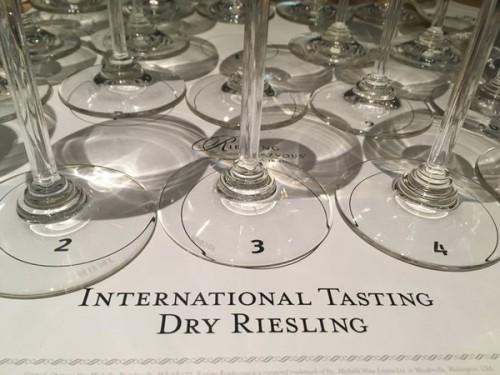
Then on Monday and Tuesday, the main sessions of the conference took place. The centrepiece of the event was a pair of morning tastings, one each day, with 20 Rieslings served blind at each. Monday’s session covered dry styles, while Tuesday’s looked at wines with a bit or a lot of residual sugar. These tastings were global, and covered wines from cheap ($8) to very expensive price points. This made it very interesting. Hands up all those who gave the $8 Chateau Ste Michelle Riesling a high score. The good news for you: you can drink cheaply for ever.
Each day had a separate panel and Ray Isle (Monday) and Joshua Greene (Tuesday) managed these panels very well. My only criticism is that the panels seemed eager to like everything, and in a few cases should have been a little more critical, and that too much attention was given on day two to guessing the identity of the wines. Seriously, dudes, you do no one any favours if when you get on a panel you just issue polite platitudes, and patronise the wines from emerging regions with excessive praise. You have been hired for your opinion. Be critical.
I learned quite a bit from these tastings. Riesling is one of the varieties where separating old world from new is actually quite difficult in many cases. It’s an incredibly adaptable grape, making compelling wines across a range of different climates. It’s also quite a good interpreter of terroirs: Rieslings grown on different soil types taste quite different, and this is something I’d love to explore in greater depth. Then there’s the curve ball of residual sugar. I don’t know any other variety where sugar levels vary so widely. The ability to manage sweetness and still be in balance is helped by Riesling’s ability to maintain good acidity levels. There’s also the interesting issue of phenolics, and their contribution to texture and flavour.
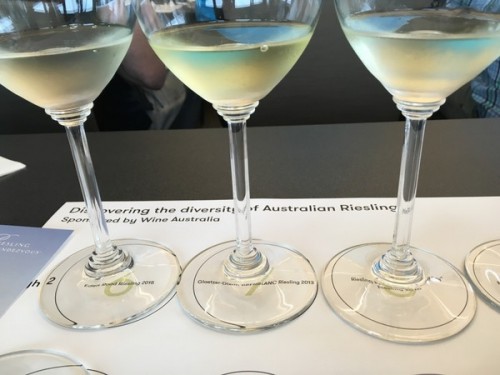
After the morning sessions, each afternoon had breakout sessions. On Monday I went to the Australian Riesling session, ably chaired by Mike Bennie. The classic Clare and Eden valley styles have always been bone dry. In part, this is a reaction to the cheap ‘Rieslings’ of the 1960s and early 1970s, when the name of the variety was used generically to describe the cheap slightly sweet whites that were popular at the time. I like the classic dry styles quite a bit, but I’m also very excited by the new wave of Aussie Rieslings that are exploring the Riesling flavour space a bit more fully.
On Tuesday I attended the session looking at the terroirs of Alsace. This was led by Thierry Fritsch of the Alsace Wine Bureau, and explored some very interesting concepts. In particular, we looked at the influence of soil type on Riesling flavour. Fritsch put up a slide showing how he thinks the different Alsace soil types influence Riesling flavour. We tasted some really interesting wines, but it would have been even better if they’d each been chosen to illustrate specific terroir influences. Instead, a few of them were from a mix of terroirs, and thus weren’t as instructive as they could have been.
This was a great event. There was a real community spirit, with Riesling nuts from across the world. The continued popularity of Riesling among wine trade people still contrasts with the fact that many normal consumers don’t quite get it, and aren’t prepared to pay good money for it. But, having said this, Riesling is a grape that can make pretty good inexpensive wines.
Riesling Rendezvous does have a bit of a feel of a religious convention though. I’m a believer, but I also believe in other varieties, too. I even like Sauvignon Blanc, although I didn’t tell anyone at the conference: I would have been booted out pretty quickly. And although Riesling is one of the most adaptable grape varieties, even die hard Riesling fans will have to concede to Chardonnay, which makes stunning sparkling wine, lovely crisp unoaked wines, and full flavoured complex barrel fermented wines. It doesn’t do sweetness well, so it has to concede this ground to Riesling.
Apart from coaching consumers on etiquette at the grand tasting, there’s nothing I’d change about Riesling Rendezvous, and I’d be back in a shot.
4 Comments on The Riesling Rendezvous 2016, Seattle, Washington State
Great article. It’s a shame that consumer’s think they have to “get” a Wine in order to but it and like it. Though i understand this confusion with Riesling, having so many styles (not to mention appellation and hierarchy regulations).. Still a great wine from a sommelier point of view thanks to versatility and wide price range. Regarding the rendezvous and criticism, mr. Thierry doesn’t appreciate being questioned from my experience 🙁 it’s always a shame when professionals don’t have the courage to go outside their comfort zone..
Maybe we can just accept that some grapes are not for everyone. Not everything has to be the pleaser of everyone.
Quote..”The continued popularity of Riesling among wine trade people still contrasts with the fact that many normal consumers don’t quite get it, and aren’t prepared to pay good money for it”.
Have to agree but at the store where I help out from time to time, many buyers looking for a nice white perhaps never seem interested in a riesling, be it from Australia, BC, Ontario, Alsace.. and of course Germany.
My favorite wine; whether sweet or dry.